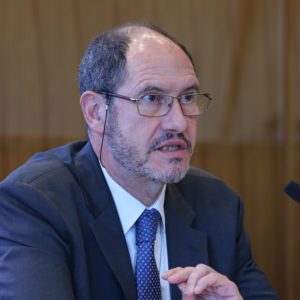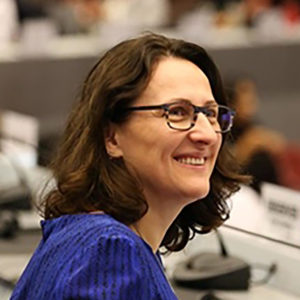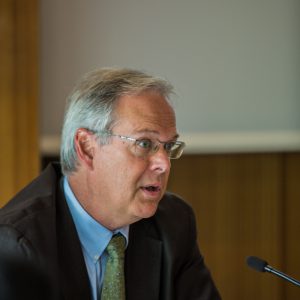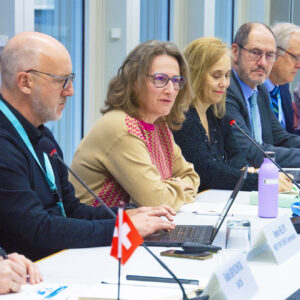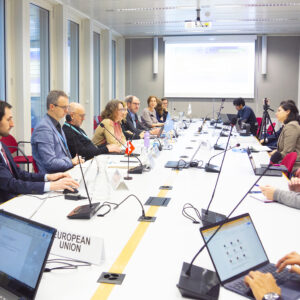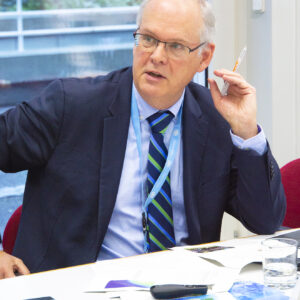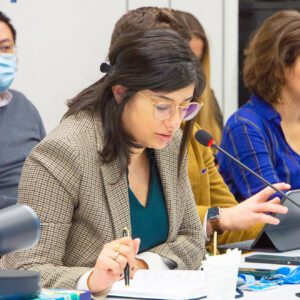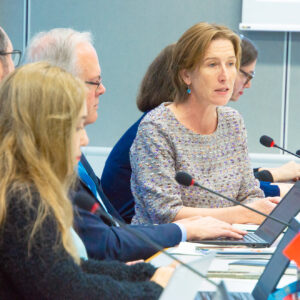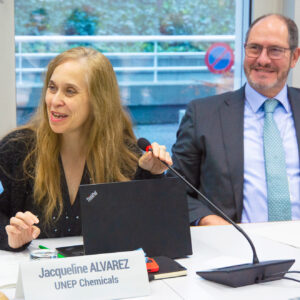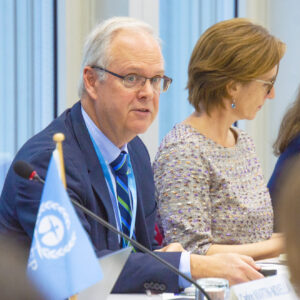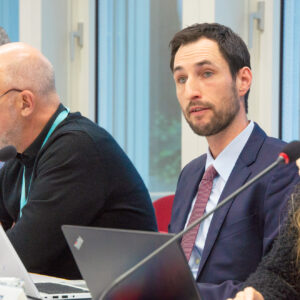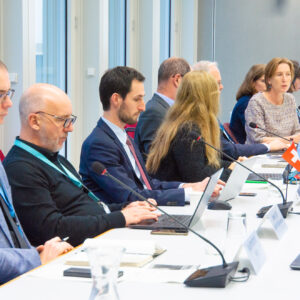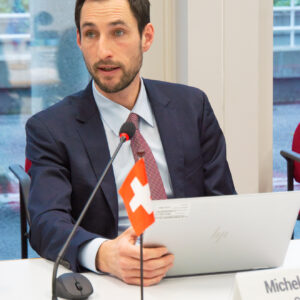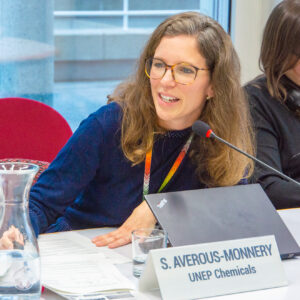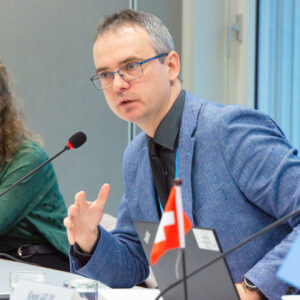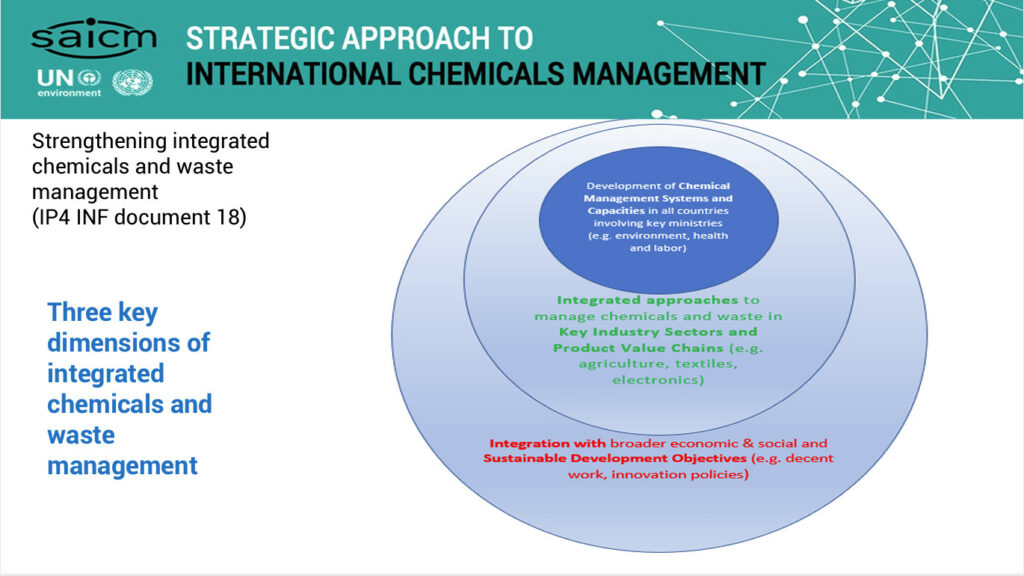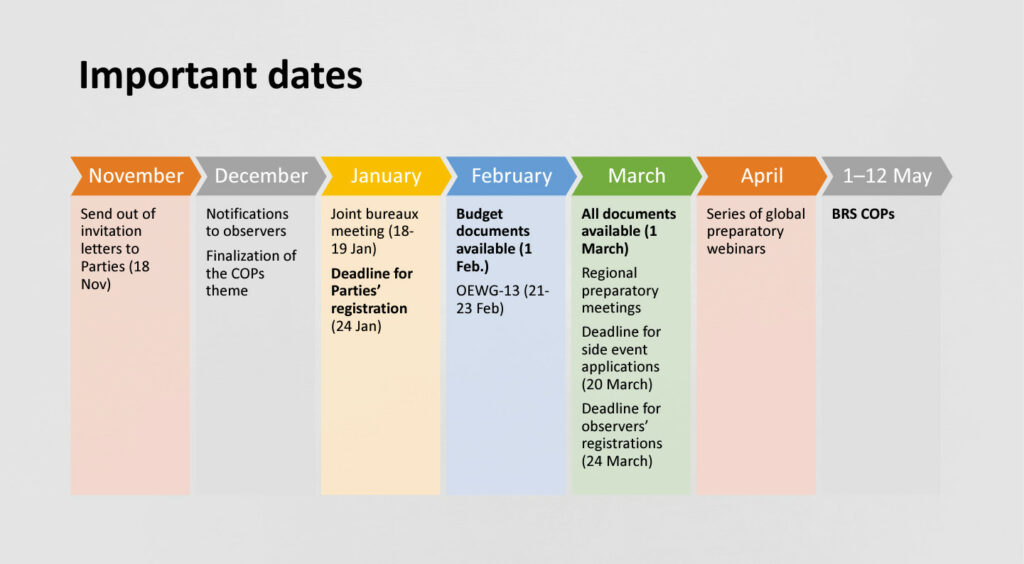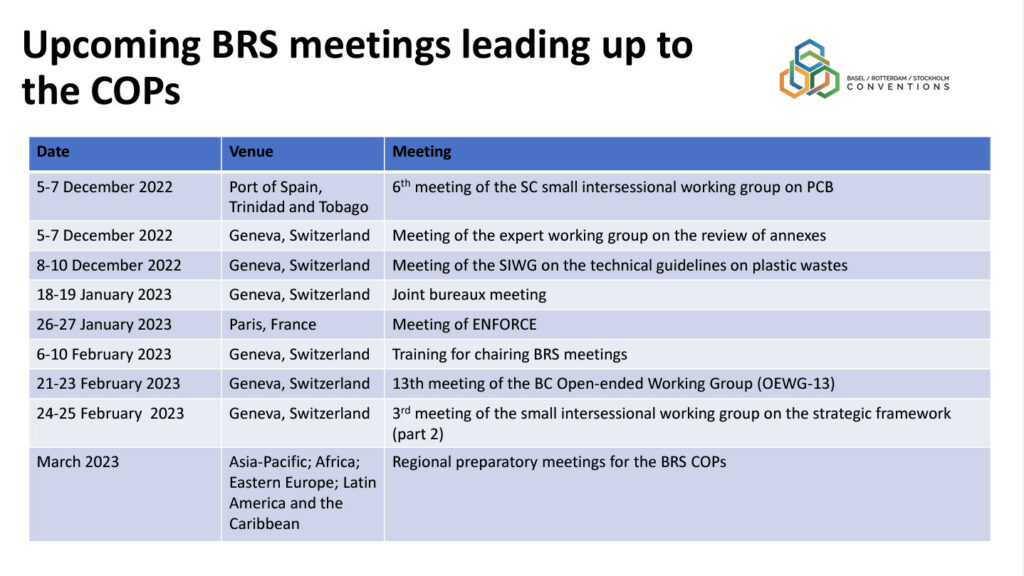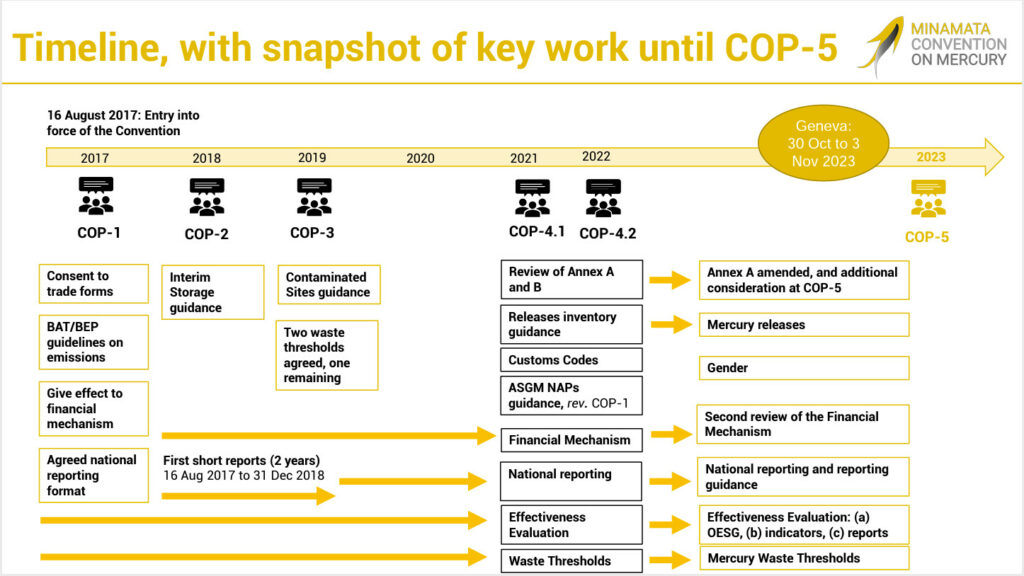Événement Conférence
Chemicals and Waste Negotiations Briefing

07 Dec 2022
10:00–12:00
Lieu: International Environment House I & Online | Webex
Organisation: Geneva Environment Network, Branche produits chimiques et déchets du PNUE, Conventions de Bâle, Rotterdam et Stockholm, Convention de Minamata, Strategic Approach to International Chemicals Management
This briefing, organized within the framework of the Geneva Environment Network, reviewed the outcomes of the negotiations related to chemicals and waste in 2022, and presented the important conferences scheduled in 2023.
About this Session
This Chemicals and Waste Negotiations briefing, organized within the framework of the Geneva Environment Network, provided an overview of the work and key activities to advance the sound management of chemicals and waste globally. It reviewed the outcomes of the negotiations related to chemicals and waste that took place in 2022, and presented the latest information on the important conferences scheduled in 2023, as well a follow-up on resolutions adopted at the UN Environment Assembly.
Next year, major negotiations on chemicals and waste include:
- 1st Session of the Open Ended Working Group (OEWG1) of the Science-Policy Panel to contribute further to the sound management of chemicals and waste and to prevent pollution | Bangkok, Thailand, January-February 2023
-
13th meeting of the Open-ended Working Group of the Basel Convention (OEWG-13) | Geneva, Switzerland, February 2023
- Resumed session of the 4th meeting of the Intersessional Process considering the Strategic Approach and sound management of chemicals and waste beyond 2020 | Nairobi, Kenya, February-March 2023
- 16th Meeting of the COP to the Basel Convention, the 11th meeting of the COP to the Rotterdam Convention and the 11th Meeting of the COP to the Stockholm Convention (BRS COPs) | Geneva, Switzerland, May 2023, as well as subsidiary body meetings leading up to the BRS COPs
- 5th Session of the International Conference on Chemicals Management (ICCM5) | Bonn, Germany, September 2023
- 5th Meeting of the Conference of the Parties to the Minamata Convention on Mercury | Geneva, Switzerland, October-November 2023
- 2nd and 3rd Sessions of the Intergovernmental Negotiating Committee to develop an international legally binding instrument on plastic pollution (INC-2 and INC-3) [dedicated briefings to follow]
Speakers
By order of intervention.

Kevin HELPS
Principal Officer of the Science-Policy panel on Chemicals, Waste and Prevention of Pollution, UNEP
Highlights
We are live!
Join us for a look ahead onto #chemicals and #waste negotiations in 2023 ➡️ https://t.co/tmEY44ot7K pic.twitter.com/cxGrTYyZsd— GENeva Environment Network (@GENetwork) December 7, 2022
Video
Photo Gallery
Summary
Welcome and Introduction
Jacqueline ALVAREZ | Chief, Chemicals and Health Branch, UNEP
This year was a year of change, where we learned many things and recognized the need for face-to-face activities.
2023 is a year of promise. We have a lot of negotiations coming in, and we are going to hopefully make a change in the near future. Many of the things we’ll be embracing as new will have ending in 2024, but we still have a lot of work to do.
INC-1 Negotiations | 1,300 people met in Punta del Este in Uruguay for the first meeting of the International Negotiating Committee (INC-1) to develop and adopt a legally binding instrument on plastic pollution. It’s good to see how these principles we have been embracing in the agenda are continuously being used because they are working: lifecycle approach, systems thinking, benign by design, need for technological change, need to address waste in a very good manner, the POPs presence in plastics, and how to deal with zero-waste approaches.
Everyone was repeating the need to do these things based on science. A new treaty building on what we know needs to have new features. The [new science-policy panel] needs to be creative and innovative to put these forward. It needs to be feasibly, something we can work towards.
Carlos MARTIN-NOVELLA | Deputy Executive Secretary, Basel Rotterdam and Stockholm Conventions
The BRS Secretariat has been in an intense intersessional period since the BRS COPs in June 2022. With 14 meetings organized since the last briefing, and 8 planned meetings until the next COPs in May 2023, totaling to 22 meetings, you can imagine the intensity of the work of the Secretariat.
The BRS Secretariat has also been very active in raising awareness on the work under the three conventions to protect human health and the environment from hazardous wastes and chemicals, and in contributing to the objectives of the MEAs:
- In a High-level discussion held in the UNFCCC COP27, BRS Secretariat emphasized the links between illegal traffic of waste, poor waste management, and greenhouse emissions.
- The BRS Secretariat also participated in the last plenary of the IPCC with the same objectives. See report on Chemicals, wastes and climate change: Interlinkages and potential for coordinated action by BRS Conventions and Minamata Convention.
- At INC-1.
- Through the Plastic Waste Amendments, the Basel Convention is the only internal treaty to legally bind countries to minimize the generation of plastic waste through the control of the transboundary movements and ensure the environmentally sound management of plastic waste.
- The Stockholm Convention controls several hazardous chemicals used in plastic production that requires countries to manage waste of such chemicals in an environmentally-sound manner.
- With Norway’s support, a study is being undertaken to map global governance landscape of plastics and associated chemicals, and the gaps and complementarities with existing multilateral instruments. The study is set to provide a possible consideration of a new plastic instrument regulating plastics and associated chemicals. The report is open for comments by 10 January 2023.
- Convention on Biological Diversity COP15.
- The global biodiversity framework has 22 targets. The BRS Secretariat has contributed to achieve Target 7 to reduce pollution from pesticides fertilizer and waste. See report on Interlinkages between the chemicals and waste multilateral environmental agreements and biodiversity by BRS and Minamata Conventions.
- Collaboration with Minamata Convention, SAICM, and Science-Policy Panel. We have focused on cooperation with them. Under this task force coordinating the work of the Secretariats, inter-secretarial working groups were established to enhance coordination and work, such as on mercury waste and various Secretariat services. We will report on future coordination for consideration in upcoming COPs.
- Participation in OEWG-1 on SPP.
We welcome the European Union draft on packaging and packaging waste regulation that contributes to the work of Basel Convention. If approved by the European Parliament and Council of Ministers, the policy has a potential to become a game changer in addressing plastic waste packaging. This will be a huge contribution as well to INC-1.
Monika STANKIEWICZ | Executive Secretary, Minamata Convention on Mercury
On Biodiversity | As the world comes together to address global biodiversity loss and its interlinkages with climate change and pollution, I would like to emphasize on the strong links between actions to address biodiversity loss and mercury pollution. Though the the Geneva Executive Briefing on the CBD was indeed useful, it did not give enough emphasis on pollution and its role in driving biodiversity loss, including in the marine environment.
Mercury is an extremely toxic pollutant, that once released into the marine environment through anthropogenic sources puts further pressure on biodiversity and ecosystems. In the tropical forest where mercury is used in artisanal and small-scale gold mining, there are multiple impacts of mercury being released into air, water and land. In the Amazon, deforestation can have a major impact on the cycling of mercury and its absorption into the environment. In oceans, mercury is accumulating in marine organisms and makes some of the fish species unsuitable for consumption in any large quantities, especially by pregnant and breastfeeding people. In those environments, mercury impacts many ecosystem functions: provision of food, air filtration, water purification, livelihoods of millions, including Indigenous Peoples.
Recognizing this and against this background, the Conference of the Parties this year adopted a decision that, for the first time, calls for closer cooperation between the Minamata Convention and the CBD, by requesting Secretariats to come up with recommendations how the Conventions can contribute to the implementation of the post-2020 global biodiversity framework (GBF).
This post-2020 GBF, being negotiated as we speak, includes Target 7 on pollution, which is part of the work on implementation of the GBF. It remains to be seen as to what the outcome of the negotiations on this will be, but now, based on our experience and discussions, much work remains to be done to raise awareness on the Minamata Convention. Building this first step to raise awareness is the necessary foundation and enabler of greater integration at the national, global levels when implementing the Convention and the GBF.
Being nature-positive for the people and planet is the way forward to address one of the triple planetary crisis. The Minamata Convention is one instrument to help achieve that. This will be the message and commitment I will bring to the high-level segment of COP in Montreal.
On Milestones | The Implementation and Compliance Committee is something to draw on when negotiating the Plastics Treaty. Having a Committee such as this from the very beginning is clearly a benefit to a multilateral environmental agreement. Having a financial instrument to support the implementation of the Convention is equally important.
Our IC Committee has recently met, and will be meeting again next year. They will be looking at the full national reports submitted by Parties that provide information and clearer picture on the discrete needs of each of the Parties in implementing it.
This needs to be met with support: capacity building, technical assistance, including through this financial mechanism (GEF and Specific International Programme, SIP). With the record replenishment of GEF-8, our hope is that SIPs will enjoy a similarly robust replenishment at a much smaller scale, but for its distinct purposes that is not fulfilled by GEF or the Special Programme. We see a growing interest in the capability of developing countries to apply for SIP. We invite countries to consider providing contributions to the SIPs so that the Convention can fulfil its aims in the first decade of implementation.
We had a very good governing board of the SIP just recently. I hope that for the next meeting, I could bring a good message that we have sufficient funding to open the call for project proposals.
Science-Policy Panel on Chemicals, Waste and Pollution Prevention
Kevin HELPS | Principal Officer, Science-Policy Panel on Chemicals, Waste and Prevention of Pollution, UNEP
There has been some progress since the last briefing.
Background | The Science-Policy Panel (SPP) comes from UNEA resolution 5/8, in order to deal with one of the triple planetary crisis. This completes the triplet, alongside IPCC and IPBES. It aims to complete the OEWG process, and hold an intergovernmental meeting at the end of 2024. There are some factors that may delay the process.
Timeline
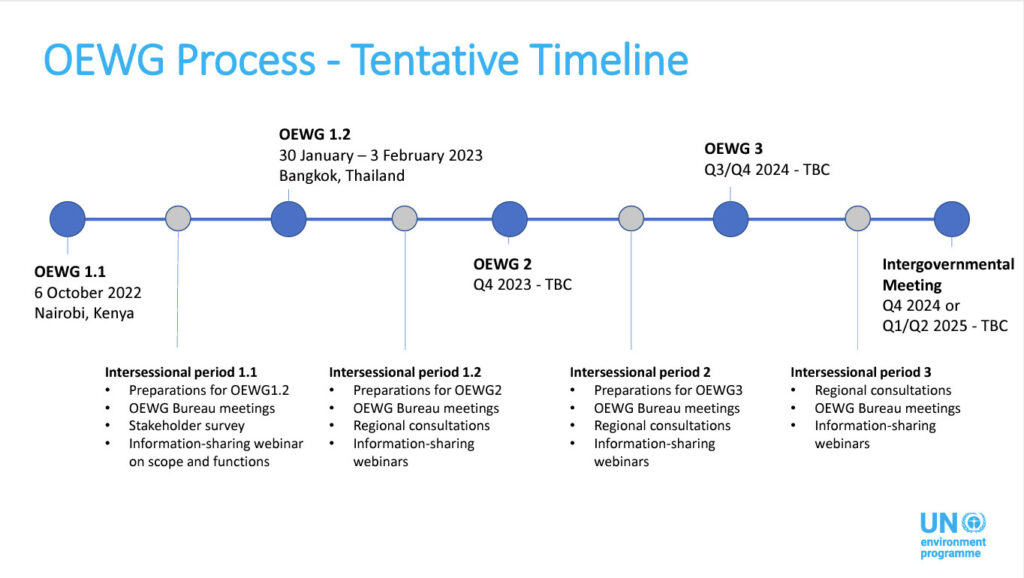
Outcomes of OEWG1.1 | With close to 500 participants representing over 80 Member States, UN entities, MEAs, SAICM, accredited IGOs and NGOs, academia and private sector/industry.
- Election of 7 of 10 Bureau Members (list of members), including the Rapporteur and Chair
- Pending finalization of Bureau election
- Eastern Europe group to finalize Bureau membership
- Iraq Vice-Chair to be replaced by China for Asia-Pacific group
- Adoption of UNEA Rules of Procedure to apply mutatis mutandis for the OEWG
- Initial exchange of views on the establishment of a science-policy panel
OEWG 1.2
Practical Information | As the resolution requires to start its work in 2022, the first session was divided into two sessions, with the substantial matters to be discussed in the second part.
- OEWG 1.2 will take place in-person from 30 January to 3 February 2023, with regional and other preparatory meetings on 29 January 2023 in the UN Conference Centre, ESCAP, in Bangkok. → Registration open until 20 December 2022.
- Application for travel support now closed. Member States and groups are encouraged to go to Regional Bureau member concerned, should the case be necessary.
- More information available on the website.
Agenda | The agenda of the session can be seen here.
- Key points include focusing on issues related to scope and functions of the Panel, and on rules and procedure and governance.
- Majority of the work and contact groups to be established will focus on theses, alongside budget and workplan.
- We hope to make significant progress on the functions, as they are well-defined in the resolution.
- An options paper will be shared soon on what these functions would look like.
- A document was also developed examining the potential scope, options, and decisions to be made by States.
We are dependent on a clear set of functions and scope in order to define the stakeholders with whom we need to interact. At the same time, we need a broad group of stakeholders to have input into these discussions, alongside Member States to table proposals and suggestions as to functions and scope. We hope to have an inclusive process academia, industry in its broadest sense, civil society, NGO groups to have an opinion, ideas and suggestions.
Main Expectations | These include finalising election of Bureau Members, including election of Chair, and discussions on issues of scope and functions of the Panel.
Timetable, budget and sequencing of OEWG work will also be considered. Stark realisation: After this meeting, all funds for operation of OEWG will be exhausted, which can cause pausing of the work. This could cause delays in 2nd and 3rd meetings well into 2025.
Meeting Documentation | Meeting documents to be available on the website. Advanced English version has already been published, while translated documents to be available before the six-week period.
Deep-dive Dialogues on Scope and Functions | Proposed to be held in the margins of OEWG 1.2, the series will inform discussions on scope and functions of the Panel through an inclusive dialogue across stakeholder groups.
OEWG Process | Budget Status | Financial contributions from France, Germany, Norway, Switzerland and the UK. USD 275,000 from 2022-2023 UNEP Environment Fund.
Most Secretariat costs covered by UNEP thus far. Member States in a position to do so are invited to provide financial contribution to support delivery of the process.
Stakeholder Engagement | Engagements with various organizations are underway, including WHO and IOMC, relevant MEAs, other panels and assessment bodies and processes, CSO and IGOs, academia, and the private sector.
Stakeholder Engagement Survey | With 386 answers so far, the survey was circulated to all Member States and other stakeholders. Analysis of the document to be provided through INF/6.
Webinar Series | The series can be found on the website.
- Next one on “Scope and functions of the Panel” will take place the week of 16 January 2023.
- Webinar on OEWG 1.2 Follow-up will be in February 2023.
- More to be developed: Academia and industry involvement, OEWG 2 overview, OEWG 2 outcomes, Horizon scanning in the SPP
OEWG National Focal Points | Member States were invited to designate national focal points to the SPP OEWG process. We are still missing some with 109 registered. We are requesting Bureau members to assist in filling gaps.
Strategic Approach to International Chemicals Management
Rafal BRYKOWSKI | Programme Management Officer, SAICM Secretariat
IP4 Outcomes | The first session of the 1st Session of 4th Meeting of the Intersessional Process considering the Strategic Approach and sound management of chemicals and waste beyond 2020 (IP4) took place in Bucharest, Romania from 29 August to 2 September 2022.
It was attended by almost 300 participants from Member States, industry, civil society, academia and youth.
The delegates welcomed the resulting Co-Chairs’ consolidated text in plenary early Friday evening as a significant achievement.
- Agreed to suspend IP4 and resume it in early 2023:
- ICCM5 announced to convene from 25-29 September 2023, in Bonn, Germany.
Strengthening integrated chemicals and waste management (IP4/INF/18) | Proposed by IOMC, there are three key dimensions of integrated chemicals and waste management.
Resumed Session of IP4 | Taking place in Nairobi, Kenya from 27 February to 3 March 2023, it will be preceded by technical briefings on 25 February and regional, stakeholder and sectoral meetings on 26 February. It will be held in a face-to-face set-up, with streaming available, and not online participation.
Invitation and the provisional agenda have been sent to SAICM Stakeholders on 11 November 2022. Practical information for the meeting participants is available at IP4 Information Note for Participants.
Participation and Registration | Participants are kindly requested to register online at later than 14 December 2022 for participants requesting funding and until 20 January 2023 nonfunded delegates.
In line with ICCM resolution IV/4, the Bureau Member and the Regional Representative from each region and the representatives of the stakeholders’ groups (health, labour and for and NGOs) will be responsible for the identification of the financed delegates from the regions and constituencies, respectively.
To support coordination among governmental stakeholders coming from the same country, a letter from the SAICM national focal point is requested for registrations coming governmental participants.
Documentation | All documents from the IP4 in Bucharest are available at the dedicated SAICM website. Further information on the resumed IP4 meeting will be made available on the SAICM website in due course.
Deadline for posting the meeting documents (working and information documents) is January 2023. You may contact saicm.chemicals@un.org for further information.
IP4 Consultation Process | The IP co-chairs launched a consultation process to share high-level reflections, inform participants of substantive issues at IP4.2, and to receive feedback.
Timeline of the process is as follows:
- 1 November: IP Co-Chairs provided an overview of the consultation process with its objectives and relevant timelines.
- 4 November – 2 December: Review period. Consolidated comments from constituencies to be submitted to the SAICM Secretariat via the Bureau.
- 15 December: The update on the consultation process and a draft text on additional recommendations will be provided at the ICCM5 Bureau meeting that will also discuss the way forward ahead of the resumed IP4.
Regional Briefings | Following the posting online the documents for the resumed IP4 meeting in mid-January 2023, virtual regional briefings will be organized by the SAICM Secretariat, in consultation with the Bureau members.
Virtual briefings are expected to take place in January/February 2023 for Africa region, Asia-Pacific region, Central and Eastern Europe region, Latin America and Caribbean region, and Western Europe and Others region.
Basel, Rotterdam and Stockholm Conventions
David OGDEN | Chief, Governance Branch, Basel, Rotterdam and Stockholm Conventions
The BRS Secretariat is busy with backlog from COVID-19, as well as only having 11 months between COPs. The BRS COPs will also be held only face-to-face.
Updates on Intersessional Work
We’re almost halfway through the intersessional work, which include all ongoing meetings. The goal is to ensure all subsidiary bodies meet. Updates on each Convention’s intersessional work are listed below.
2023 BRS COPs | The BC COP-16, RC COP-11 and SC COP-11 will take place from 1-12 May 2023 at CICG in Geneva, Switzerland. Preparatory meetings will take place on 30 April 2023.
It will only be held face-to-face, with no high-level segment. The meetings website can be found here.
COP Bureaux Meetings | Ahead of the COPs, meeting will take place to prepare for the May meetings.
- Individual meetings 11 October (BC), 25 October (RC), 27 October (SC): Provided initial feedback on the tentative schedule of work of the COPs and meeting arrangements
- Joint bureaux meeting, 18-19 January 2023: To finalize the tentative schedule of work of the COPs
Important Dates | Registration, documents and other preparatory meetings will be made available throughout the following months.
Upcoming Meetings | To prepare for the COPs, preparatory meetings per region will take place:
- Asia-Pacific | 14-16 March 2023 | Bangkok, Thailand
- Africa | 21-23 March 2023 | Dakar, Senegal
- Eastern Europe | 28-30 March 2023 | Zagreb, Croatia
- GRULAC | 28-30 March 2023 | Panama City, Panama
Other upcoming BRS meetings leading up to the COP include the following, notably the training for chairing BRS meetings, as these can prove useful in chairing different meetings and negotiations beyond the Conventions.
PCBs Fair | As a special part of each COPs’ programme, a fair on Polychlorinated biphenyls (PCBs) aims to raise awareness on the urgency to accelerate action to meet the upcoming 2025 (eliminate use) and 2028 (complete disposal) PCB deadlines.
Deadline for Parties and others to submit expressions of interest: 24 February 2023. More info will be made available soon.
Minamata Convention on Mercury
Claudia TEN HAVE, Senior Policy and Coordination Officer, Minamata Convention on Mercury
Timeline | In preparation for COP-5, taking place in Geneva from 30 October to 3 November 2023, here is a snapshot of the key work.
First Effectiveness Evaluation
Indicators | Ensuring delivery of the Convention’s goals, the indicators used in effectiveness evaluation process, was refined, and is for consideration and possible adoption by COP-5.
The draft refined list of indicators are now open for comments until 31 January 2023. It’s important to know whether the refined list is in line with what Parties need and want. → See enlarged slide and materials from Minamata Online on 16 November 2022.
Open-ended Scientific Group | Established at COP-4, the OESG is mandated to develop
- plan for monitoring data collection and summary,
- plan for emissions and releases data summary, and
- plan for data analysis.
Two drafts (1 and 2 above) will be shared with parties for review in early 2023. Having met 5 times online, the OESG will meet face-to-face in Geneva on 27-31 March 2023. Any party wishing to join may still do so. → See OESG timeline
The OESG is one of the two bodies established under effectiveness evaluation. The second body and its terms of reference has yet to be finalized, as the number of representatives per region has yet to be determined. The second group will oversee Effectiveness Evaluation.
Other Reports | Other reports are also being prepared, following COP-4 decision:
- Mercury Trade, Supply and Demand Report | Initial phase of the report is now complete. Parties and other stakeholders were invited to indicate experts to contributed on the outline. Second phase has started, and two round of review by Parties are foreseen for 2023.
- Article 21 Synthesis Report | Analysis of full reports is underway. In early 2023, outline will be made available. Second phase of development of the report will begin in 2023.
Gender | There was a supportive decision at COP-4 on gender, which provides specific attention to needs of groups in vulnerable situations.
The Secretariat has organized two online consultations to receive input on a draft gender action plan. The draft action plan is expected to be submitted for consideration by COP-5. → More details on work on gender at Minamata Convention
2nd Review of Financial Mechanism | The second review of the financial mechanism requested for submissions in end September. Very few Parties have made submissions, as such even though deadline has passed, the Secretariat encourages Parties and other to make submissions so that the independent reviewer has as much information at-hand.
National Reporting | There is high-level of reporting by Parties at 92%. We are reaching out to remaining 10, with expectations to receive them soon. The preliminary report has already gone to the IC Committee. The next IC Committee will be take place in March 2023.
Parties and other stakeholders are invited to provide any additional comments on the Draft Reporting Guidance by 15 December 2022. → More details on intersessional webpage and on Minamata Online session of 12 October
7th Meeting of SIP Governing Board | With quite a new board bringing in their expertise and experience, the 7th meeting took place from 22-23 November 2023. The board reviewed the implementation of all 24 SIP projects, and the status of the Specific Trust Fund.
Mercury Releases | Several meetings have occurred. The draft guidance on best available techniques and best environmental practice (BAT/BEP) to control mercury releases to land and water from relevant sources will soon be posted for comments until mid-February 2023.
Mercury Waste Threshold | The Expert Group will be meeting face-to-face in Geneva in 16-18 February 2023, back-to-back with the Basel Convention OEWG-13.
2022 General and Special Trust Funds Status | 69.83% of contributions to the trust funds were received. Parties who have not submitted are requested to contact the Secretariat should there be any questions. → More on 2022 Trust Funds Status
Important: Annex A was amended at COP-4 | With 8 additional mercury-added products amended into Annex A, including provisions for dental amalgam in part II, the amendment will enter into force on 28 September 2023, except for Parties who made a declaration under par. 5, Art. 30.
UNEP Chemicals and Health Branch
Sandra AVÉROUS-MONNERY | Acting Head, Knowledge and Risk Unit, Chemicals and Health Branch, UNEP
Providing a brief overview of the support provided by UNEP in the upcoming negotiations and events in 2023, there have been a number of briefings that highlighted the knowledge and science the branch has provided and spearheaded, such as the Global Chemicals Outlook II.
Supporting Implementation of MEAs
UNEP Global Mercury Partnership | Created in 2005 by the UNEP Governing Council, the Partnership aimed to protect human health and environment from mercury releases. The Partnership Advisory Group just had its 13th meeting in November 2022. With its webinars and reports on Mercury from Oil and Gas and Mercury from Non-Ferrous Metals Mining and Smelting, such a partnership shows how bringing stakeholders together can support and help the implementation of the agenda.
Minamata National Action Plans — Dynamic Dashboards | As the Minamata National Action Plans (NAPs) are submitted to the Secretariat, UNEP extracts this information and puts in a database. Information includes key baseline figures, occurrence of worst practices, qualitative baseline information, NAP strategies and mercury reduction targets.
The dashboard is with the support of the GEF and the Partnership.
Dashboard on Results of UNEP/GEF POPs Global Monitoring Plan Project | The POPs Global Monitoring Plan Project by UNEP and GEF puts forward information and lessons learned on POPs monitoring around the world. This helps in the policy development in various countries, such as in Vanuatu.
Others | The DDT dashboard and other dashboards are in available in the World Environment Situation Room. This also helps inform further policy developments.
Supporting Beyond 2020 Process | The Inter-Organization Programme for the Sound Management of Chemicals (IOMC), a group of 9 organizations working on chemicals management, have put forward the INF document on strengthening integrated chemicals and waste management at IP4.1.
A workshop is being organized by the IOMC and hosted by the OECD in Paris from 18-19 January 2023 to address global chemicals and waste management in chemical intensive economic sectors and value chains.
Implementing UNEA Resolutions
Green and Sustainable Chemistry | UNEA Resolution 5/7 welcomes the Green and Sustainable Chemistry: Framework Manual which highlight the crucial importance of environmentally sound innovation, and encourages their use, as appropriate. UNEP dedicates 2022-2023 to its uptake and implementation, including development with UNITAR of an e-learning course. It also includes work on specific sectors, such as the workshop taking place in Paris on 20 January 2023 on the buildings sector.
This is an illustration of 80-100 experts coming together to highlight the principle objectives on green and sustainable chemistry.
Antimicrobial Resistance (AMR) | UNEP joined the quadripartite partnership with WHO, FAO and WOAH to advance the work on AMR, particularly from the environmental perspective. UNEP also participated in the 3rd Ministerial Conference on AMR that took place in Muscat, Oman from 24-25 November 2022.
The AMR Global Leaders Group is calling for applications to become part of the Group is available on the website by end of December.
Q&A
Q from Vanessa Aliaga from the Permanent Mission of Peru to the UN and other international organizations in Geneva: Regarding the process for SAICM, there was reference to negotiations of a text. What would this text be?
Rafal BRYKOWSKI | We are now in a process of negotiating a document that in the future will create a framework for the post-2020 SAICM. The webpage has a report from Bucharest. Annex 2 contains the consolidated text prepared by the co-chairs of the process, compiling the work done by the thematic groups. The document is still in progress, as this will still be discussed in Nairobi.
Q: It was mentioned that the national focal points in the Latin America and Carribean region for the OEWG SPP were lacking. Does each country need to have one?
Kevin HELPS | The focal point nomination process has been a long, drawn-out process. We are working with our newly appointed Bureau members and our regional offices to help with the process and encourage Member States to come out with nominations. It’s also a competing priorities with the Plastic Pollution INC taking place at the same time. Access to this list to be made available on the website.
Closing Remarks
Michel TSCHIRREN | Waste and Chemicals Focal Point, Federal Office for the Environment, Switzerland
With many of the decisions taken this year, in particular at UNEA with the SPP decision and the plastic decision, and also at the BRS COP with the Basel e-waste amendment and before that the adoption of the Rotterdam compliance mechanism, and also the amendments adopted at the last Minamata COPs – with all of this the Chemicals and Waste actors showed the willingness to act on important or pressing issues. It gives me confidence that this positive commitment will continue.
2023 will be a Chemicals and Waste year with many opportunities to take ambitious steps for the Chemicals and Waste management at the global level.
Rotterdam Convention Amendment Proposal
I would of course like to highlight the Rotterdam Convention amendment proposal that was submitted earlier this year by Switzerland, Australia and Mali and which is now co-sponsored also by Ghana and Burkina Faso. David, you mentioned this proposal earlier and explained correctly its content. Let me add a few sentences about the background and rational.
At the latest Rotterdam conference of the parties there was as in the past a general frustration because of the cases where the COP failed to list chemicals in Annex III, despite the fact that the listing criteria were met.
Chemicals such as chrysotile asbestos could not be listed in the Convention although the great majority of parties have been in favor of the listing for years. Only a handful of parties opposed the listing. This undermines the objective of the convention.
This is why Switzerland, together with Australia and Mali, Ghana and Burkina Faso propose to the parties to amendment the Convention at the upcoming COP in May 2023.
The proposal foresees a new Annex, additional to the existing Annex III. Chemicals for which the COP is not able to list in Annex III will be listed in this new Annex. The decision to list in the new Annex can be taken by a three quarters majority vote as a last resort if all efforts to reach consensus are exhausted.
The new Annex has the same rights and obligations for the Parties as the existing Annex. For instance, the prior informed consent procedure would apply to the chemicals listed in the new Annex. The only modification however is that an explicit consent is required, making the new annex a bit more stringent than Annex III.
The adoption of the proposal will strengthen the Convention and will be an important step toward the sound management of chemicals.
We proponents welcome support to the proposal. Governments that would like to become a co-sponsor can contact me or the colleagues from Australia, Mali, Ghana and Burkina Faso.
Science-Policy Panel
With regard to the Science-policy panel (SPP) the upcoming OEWG1.2 meeting will be important to include from the start not just the environment community but also other sectors in particular the health side and therefore the WHO.
In terms of the scope it seems a wise approach to have a broad scope and install good procedures for priority setting and agreeing the programme of work and budget. This way SPP plenary will decide on the assessments to be carried out and will not be restricted over time when new issues will come up.
In order to ensure a good link from the latest scientific knowledge to the policy makers academia does have a crucial role. Academia must therefore be very present and involved in the SPP OEWG process from the start.
I would like to express my thanks to the Government of Thailand for hosting this meeting in January in Bangkok and UNEP for the preparatory work. I encourage all actors to register for this important meeting in Bangkok in January.
It is my pleasure to confirm the information provided by Kevin that the Swiss Government has extended the invitation to host the SPP OEWG3.
Previous Chemicals and Waste Briefings
13 September 2022 | 28 April 2022 | 27 May 2021 | 16 December 2020 | 4 July 2019 | 12 June 2018 | 26 February 2018 | 22 June 2017 | 5 April 2017 | 30 November 2016 | 26 April 2016 | 26 January 2016 | 26 November 2015 | 8 September 2015
Documents
Links
- Basel Rotterdam Stockholm Conventions Secretariat
- Minamata Convention
- UNEP Chemicals and Waste
- SAICM Secretariat
- Chemicals and Waste Special Program On Institutional Strengthening
- Update on International Environmental Negotiations Agenda | Geneva Environment Network
- Previous Minamata Briefings: 2 March 2022 | 16 October 2021


